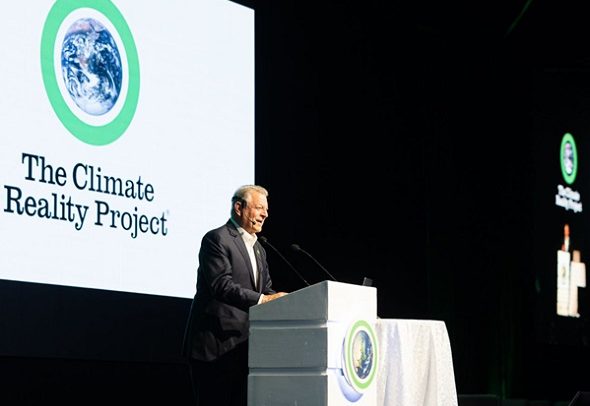Al Gore addressing participants at the training
FORMER VICE President of the United States (US), Al Gore, has charged the Ghanaian government and other African governments to remove subsidies on fossil fuel products.
Mr. Gore is of the opinion that removing subsidies from fossil fuels would stimulate the adoption of solar and wind sources of energy on the continent and help in the fight against climate change.
Speaking in an exclusive interview with the Daily Guide on the sidelines of the 54th Climate Reality Leadership Training held in Accra, Mr. Gore stressed that the removal of subsidies from fossil fuels would naturally kill the competition between fossil fuel products such as petrol and diesel and renewable sources of energy such as solar and wind.
“Those who say solar is too expensive for me to install, if the tax payers are no longer forced to subsidize the fossil fuels, the fossil fuels would not be artificially cheap as they are now. They seem cheap because the tax payers are funding them,” he argued.
Mr. Gore also charged African governments to place taxes on carbon pollution, saying, “If you want less of something, put a tax on it! If you want money to implement these [climate] solutions, get the money from the polluters who are causing the problem.”
This, he believed, would be “the single biggest change” to be implemented by any government in the fight against climate change.
He also commended African leaders for showing significant interest in placing taxes on carbon pollution at the First African Climate Summit held two months ago in Nairobi, Kenya, saying: “Many in the developed countries have given up on that but the African leaders came back to it.”
The 54th Climate Reality Leadership Training is an initiative of the Climate Reality Project, a non-profit climate action organization founded in 2006 by the former US Vice President, Al Gore and forms part of the organization’s series of global training programs aimed at educating and equipping advocates with the requisite tools needed to effectively advance climate solutions around the world.
The three-day training program focused on the potential of the people of West Africa to create a new model of sustainable development while opening the door to a better life for millions in the region.
BY Nii Adjei Mensahfio


